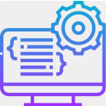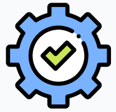Results
The PIACERE solution provides:
A new generation DevSecOps framework for infrastructural code (IaC) supporting the creation of such code, increasing its quality, security, trustworthiness and evolvability while ensuring the business continuity by providing self-healing mechanisms anticipating to failures and violations, and self-learning from the conditions that triggered such re-adaptations.
IaC DevSec

Result: DevOps Modelling Language [DOML]
Creation of IaC models based on the NFRs
- Definition of the topology and properties of the infrastructure
- Abstraction from the specifities of the IaC language and protocol
- Extendible

Result: Infrastructural Code Generator [ICG]
Automatic IaC generation based on the models
- Most prominent target IaC environments and languages (e.g. Terraform, Ansible, TOSCA)
- Code generation for provisioning and deployment orchestrators, configuration management environments, monitoring platforms and networks APIs.

Result: Verification Tool [VT]
Models and code vertification
- Verification of the models
- Code syntactic correctness, consistency and ability to fulfil specific non-functional properties verification
- SAST and security inspector components

IaC design, development and verification
- Integration of the IaC Sec Dev process
IaC SecOps

Result: Canary environment, IaC Optimized Platform
IaC simulation
- Isolated execution and testing of Infrastructure as Code behavior
- Identification of potential vulnerabilities and bottlenecks
- Catalogue of services and infrastructural elements
- Optimization combination of services and infrastructural elements

Result: IaC Execution Platform
Automatic IaC execution
- Creation of the deployment plan
- Interdependencies management
- Distribution to the subsystems that perform the actual provisioning (e.g. creating virtual machines using proper IaaS connector, installing software packages or adjusting application configuration using Ansible)

Result: runtime monitoring, Self-learning and self-healing mechanisms
IaC intelligent monitoring
- Execution logs
- Run time security verification
- QoS assurance through self learning and self-healing mechanisms

Automatic re-deployment and adaptation
- To ensure that their infrastructural code is always conforming to the SLAs committed with the end-user even if the environmental situation changes
